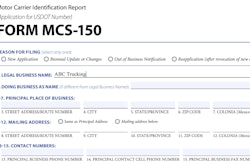Operating a small trucking company can be a never-ending battle for survival. Over the last couple years, trucking has lost a huge number of the companies previously registered with the FMCSA with authority. Rising operational costs, pretty well across the board, as an owner-operator knows, included increased insurance premiums for many and escalating fuel prices paired with increased equipment expense. ... Add to that stiff competition’s impact on freight rates and a freight economy clearly continuing to slow after post-pandemic highs, and it can quickly drive a shaky company under.
Some carriers will be tempted to cut corners, a risky proposition if trimming the fat means skipping needed preventive maintenance or looking for labor on the cheap. If you’re an owner-operator, that includes your own labor, too -- don’t sell yourself short by accepting substandard rates or an inadequate compensation package from a fleet you’re contracting with.
At the same time, difficult times might allow the cream of the crop among drivers and owners to shine. As my colleague Gary Buchs and others have noted, those willing and able to thrive through the bad times will be poised for big gains on the other side, when higher-demand driver-market realities (one way to think of the oft-invoked, so-called driver shortage) should work soundly in their favor.
[Related: Werner CEO shocked by small fleets' resilience amid trucking's 'bloodbath']
When that time comes, companies will be forced to put resources to retention of the best. Now is the time to showcase safety, to showcase compliance, time management and communication. They’ve always been critical, but they are attributes that, on the other side of the current reality, will be even more so. Excellent time management, courteous exchanges, good hygiene, and a professional appearance today will make its mark when the time for contract negotiation comes.
While sticking it out is no doubt difficult when miles and settlements take a dive, or home time is given up in favor of making up shorter miles as much as possible, there’s a lot an owner-operator can do to ease the journey on the long road ahead. I discovered that dropping my speed from 70 mph to 60 increased fuel efficiency dramatically, reducing costs in that department. While many use the rule of thumb that every single mph over 60 decreases fuel mileage a single tenth of a mile per gallon, in my experience it’s often been closer to two tenths. At that rate, 10 mph of additional cruising speed over 60 could cost you 2 miles per gallon, boosting your take-home by the same amount if you just slow down.
You can also increase fuel efficiency with the rest of the basics: proper tire inflation and overall maintenance, reduced idle time, and effective trip planning (always with a backup plan at the ready). If you have the money, add-ons that improve aerodynamics will pay for themselves in fairly short order with better fuel mileage in many cases.
And while the 15,000-mile oil drain interval is almost like a gospel for many owner-operators, extended drains with investment in a bypass oil filtration system might save anywhere from $450-$800 per oil change avoided. Overdrive’s Trucker of the Year Jay Hosty has long pushed the envelope there, using oil analysis without a bypass system in place to extend drain intervals out to as much as 100,000 miles in his Detroit Series 60, as was detailed in the feature at this link. That’s been a substantial savings for him over the years, yet the biggest, most effective savings will be in accelerator control.
 Like me, Hosty long ago figured that one out and the legend on the driver-side of the hood on his 2006 Western Star 4900EX -- Life in the slow lane, it's better over here -- tells that tale.
Like me, Hosty long ago figured that one out and the legend on the driver-side of the hood on his 2006 Western Star 4900EX -- Life in the slow lane, it's better over here -- tells that tale.
[Related: An argument for an hourly pay standard for truckers]
It might be among the faintest of silver linings for any owner struggling with current costs, but regulations that would require biz investment in expensive equipment get more difficult for trucking outsiders among lawmakers, regulators and advocates to pursue, too. Heavier-weight rules, for instance, longer trailers, side-underride guards. All would increase equipment cost, and impact fuel consumption and maintenance outlays.
And though now may be the time to shine on the operational/relational front, that doesn’t mean we should let the pressure for positive reform relax. Trucking's approach to driver compensation still needs to be seriously revamped, in my view. Required speed limiters still represent a threat to small-business competitiveness and bedrock safety. Though trucking companies have left the business in droves, it’s still tough to park a truck safely all over the nation.
We still need to keep pushing, in other words, keep bringing awareness to the problems and misplaced priorities that will most certainly impact our trucking lives. Now is not the time to back down.
There’s a long road ahead, but most of us have been on this road for years, with no thought of the exit ramp. Let's make that count for something.
[Related: How to not just survive, but thrive, through the bottom of the freight markets]










